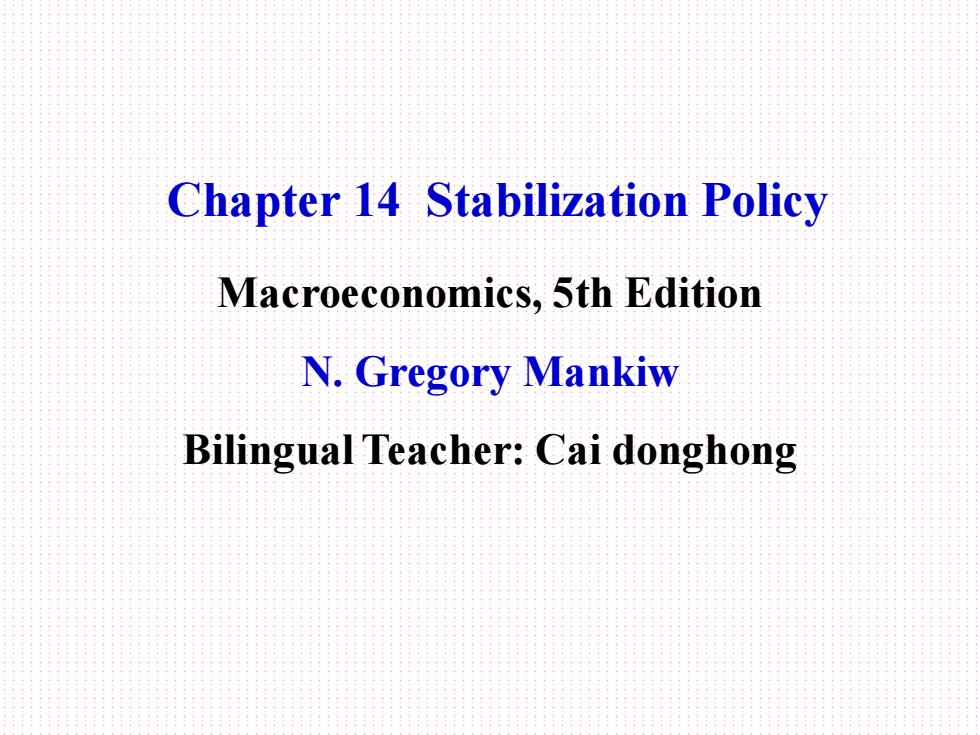
Chapter 14 Stabilization Policy Macroeconomics,5th Edition N.Gregory Mankiw Bilingual Teacher:Cai donghong
Chapter 14 Stabilization Policy Macroeconomics, 5th Edition N. Gregory Mankiw Bilingual Teacher: Cai donghong
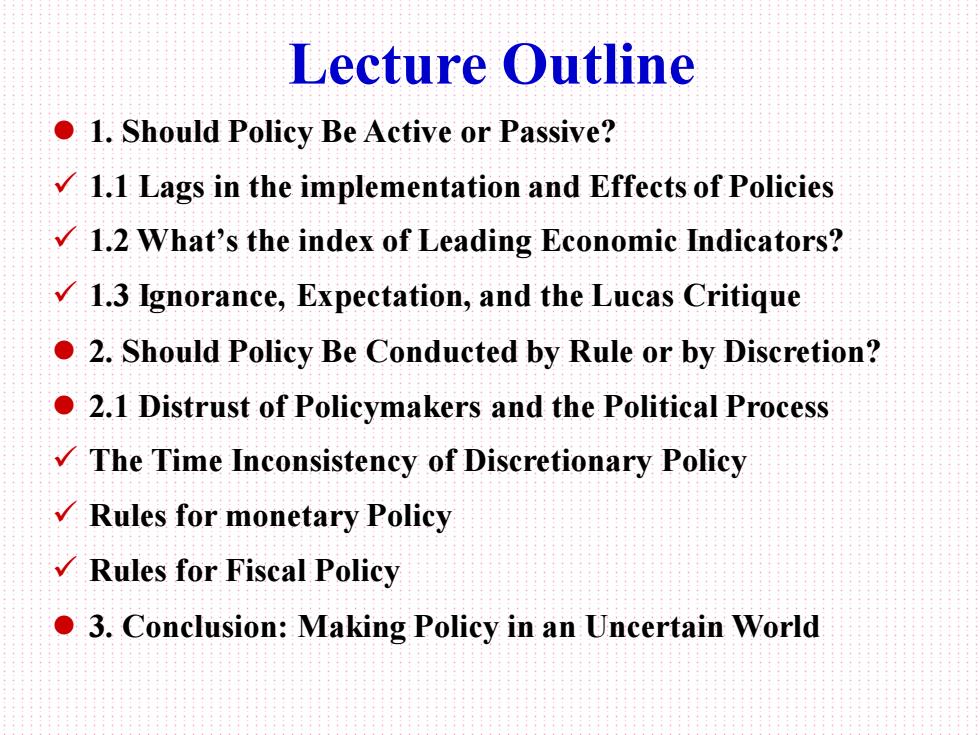
Lecture Outline 1.Should Policy Be Active or Passive? 1.1 Lags in the implementation and Effects of Policies 1.2 What's the index of Leading Economic Indicators? 1.3 Ignorance,Expectation,and the Lucas Critique 2.Should Policy Be Conducted by Rule or by Discretion? 2.1 Distrust of Policymakers and the Political Process The Time Inconsistency of Discretionary Policy Rules for monetary Policy Rules for Fiscal Policy 3.Conclusion:Making Policy in an Uncertain World
Lecture Outline ⚫ 1. Should Policy Be Active or Passive? ✓ 1.1 Lags in the implementation and Effects of Policies ✓ 1.2 What’s the index of Leading Economic Indicators? ✓ 1.3 Ignorance, Expectation, and the Lucas Critique ⚫ 2. Should Policy Be Conducted by Rule or by Discretion? ⚫ 2.1 Distrust of Policymakers and the Political Process ✓ The Time Inconsistency of Discretionary Policy ✓ Rules for monetary Policy ✓ Rules for Fiscal Policy ⚫ 3. Conclusion: Making Policy in an Uncertain World
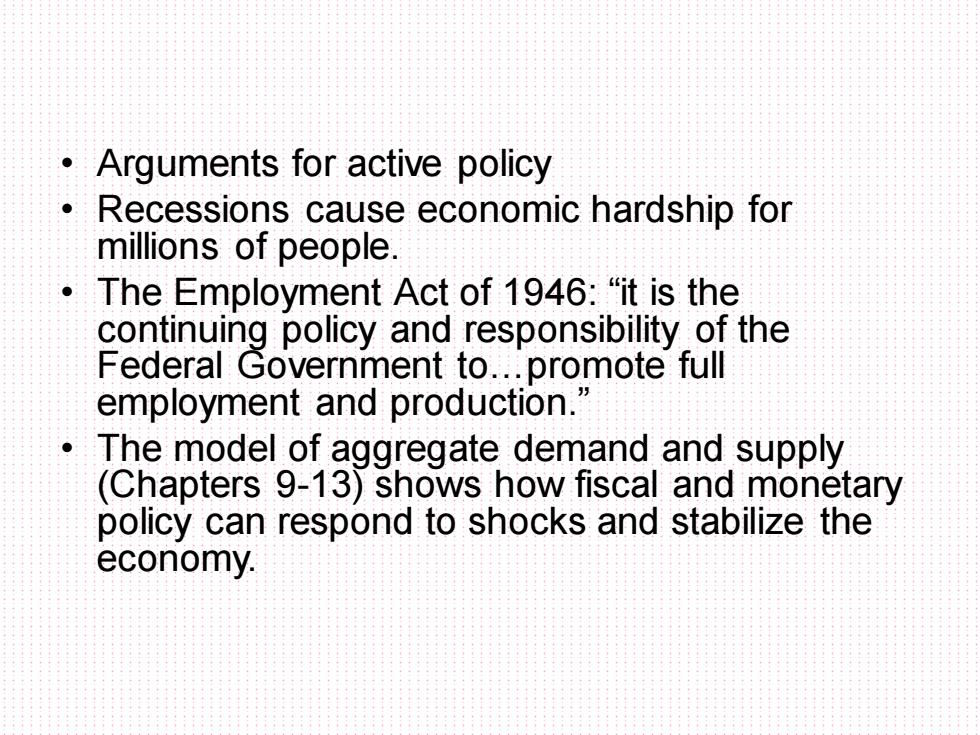
Arguments for active policy Recessions cause economic hardship for millions of people. The Employment Act of 1946:"it is the continuing policy and responsibility of the Federal Government to.promote full employment and production." ● The model of aggregate demand and supply (Chapters 9-13)shows how fiscal and monetary policy can respond to shocks and stabilize the economy
• Arguments for active policy • Recessions cause economic hardship for millions of people. • The Employment Act of 1946: “it is the continuing policy and responsibility of the Federal Government to.promote full employment and production.” • The model of aggregate demand and supply (Chapters 9-13) shows how fiscal and monetary policy can respond to shocks and stabilize the economy
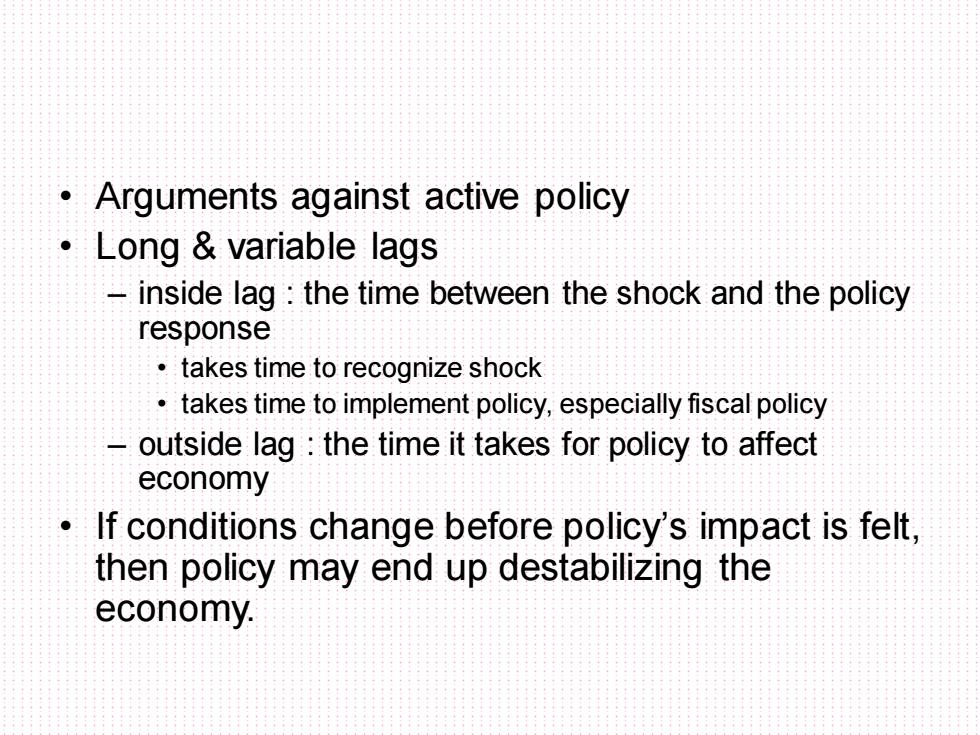
Arguments against active policy Long variable lags -inside lag:the time between the shock and the policy response takes time to recognize shock takes time to implement policy,especially fiscal policy -outside lag the time it takes for policy to affect economy If conditions change before policy's impact is felt, then policy may end up destabilizing the economy
• Arguments against active policy • Long & variable lags – inside lag : the time between the shock and the policy response • takes time to recognize shock • takes time to implement policy, especially fiscal policy – outside lag : the time it takes for policy to affect economy • If conditions change before policy’s impact is felt, then policy may end up destabilizing the economy
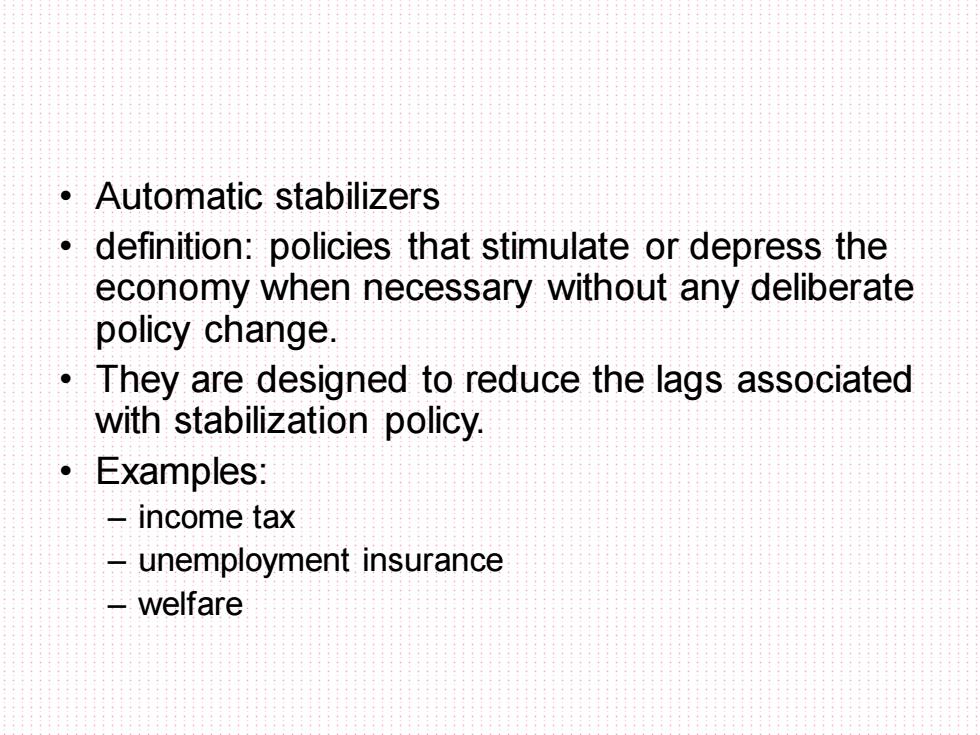
Automatic stabilizers ● definition:policies that stimulate or depress the economy when necessary without any deliberate policy change. They are designed to reduce the lags associated with stabilization policy. 。Examples: income tax -unemployment insurance -welfare
• Automatic stabilizers • definition: policies that stimulate or depress the economy when necessary without any deliberate policy change. • They are designed to reduce the lags associated with stabilization policy. • Examples: – income tax – unemployment insurance – welfare
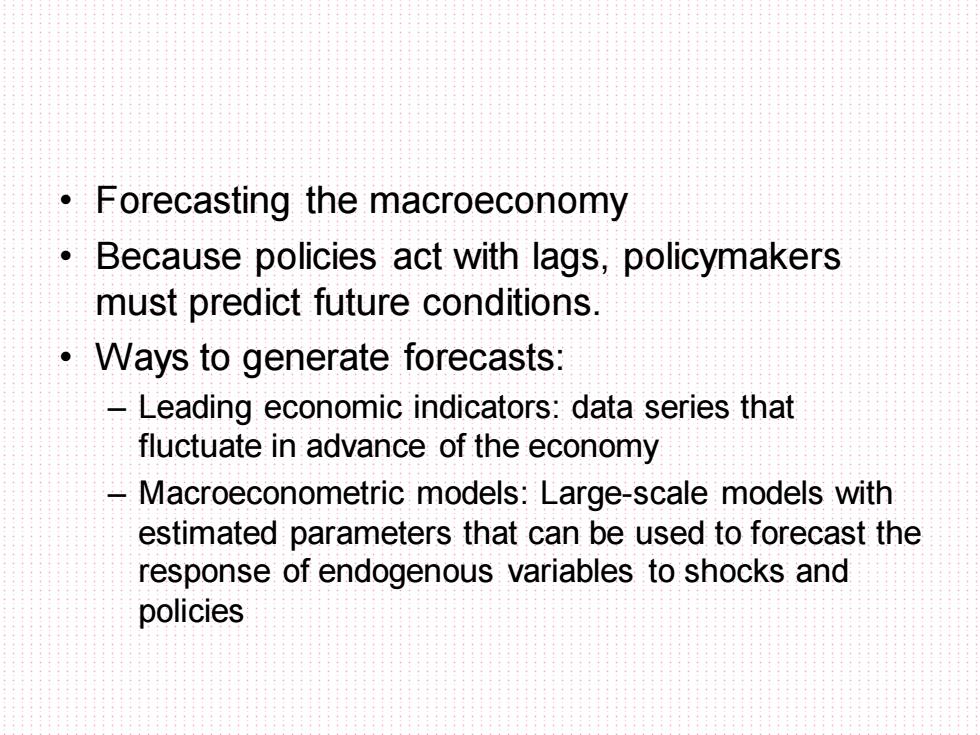
Forecasting the macroeconomy Because policies act with lags,policymakers must predict future conditions. Ways to generate forecasts: -Leading economic indicators:data series that fluctuate in advance of the economy -Macroeconometric models:Large-scale models with estimated parameters that can be used to forecast the response of endogenous variables to shocks and policies
• Forecasting the macroeconomy • Because policies act with lags, policymakers must predict future conditions. • Ways to generate forecasts: – Leading economic indicators: data series that fluctuate in advance of the economy – Macroeconometric models: Large-scale models with estimated parameters that can be used to forecast the response of endogenous variables to shocks and policies
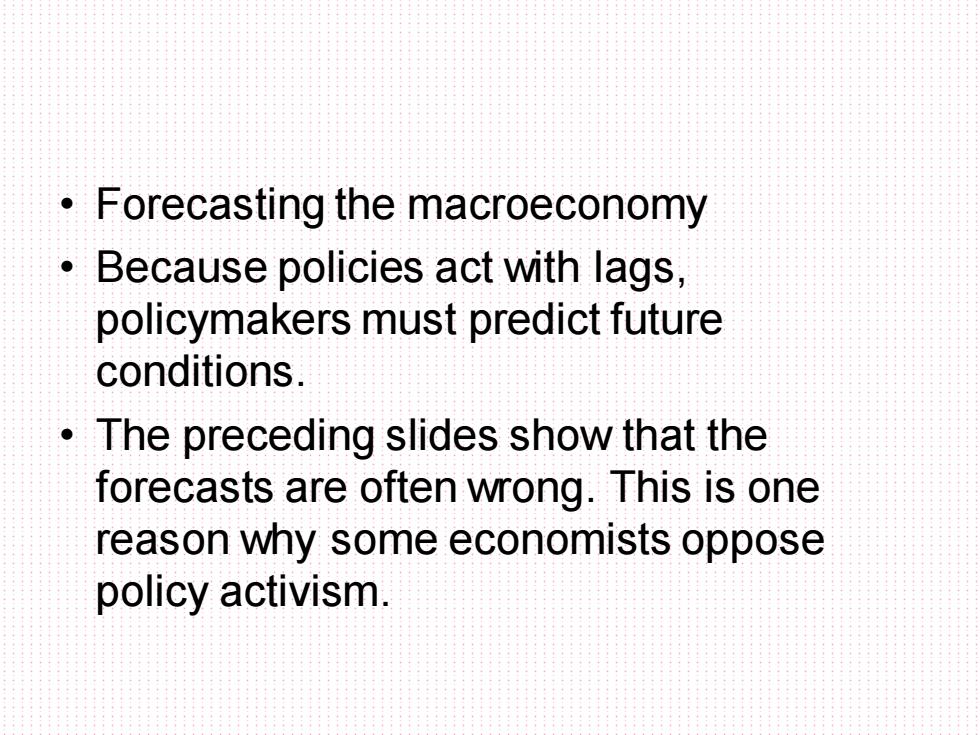
Forecasting the macroeconomy Because policies act with lags, policymakers must predict future conditions. The preceding slides show that the forecasts are often wrong.This is one reason why some economists oppose policy activism
• Forecasting the macroeconomy • Because policies act with lags, policymakers must predict future conditions. • The preceding slides show that the forecasts are often wrong. This is one reason why some economists oppose policy activism
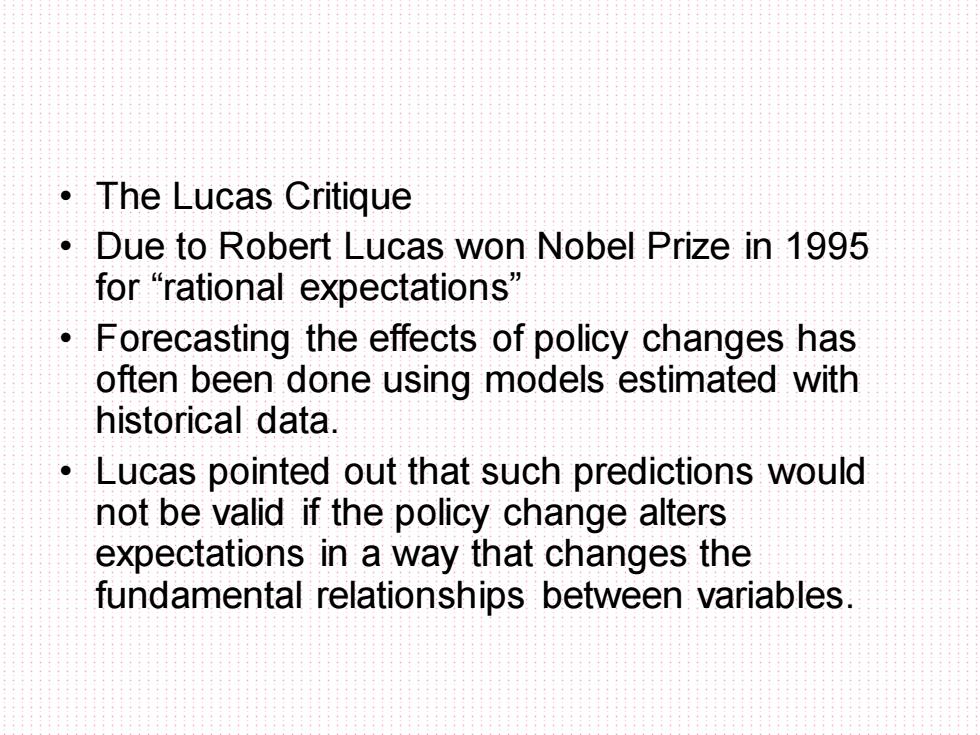
·The Lucas Critique Due to Robert Lucas won Nobel Prize in 1995 for“rational expectations” Forecasting the effects of policy changes has often been done using models estimated with historical data. Lucas pointed out that such predictions would not be valid if the policy change alters expectations in a way that changes the fundamental relationships between variables
• The Lucas Critique • Due to Robert Lucas won Nobel Prize in 1995 for “rational expectations” • Forecasting the effects of policy changes has often been done using models estimated with historical data. • Lucas pointed out that such predictions would not be valid if the policy change alters expectations in a way that changes the fundamental relationships between variables
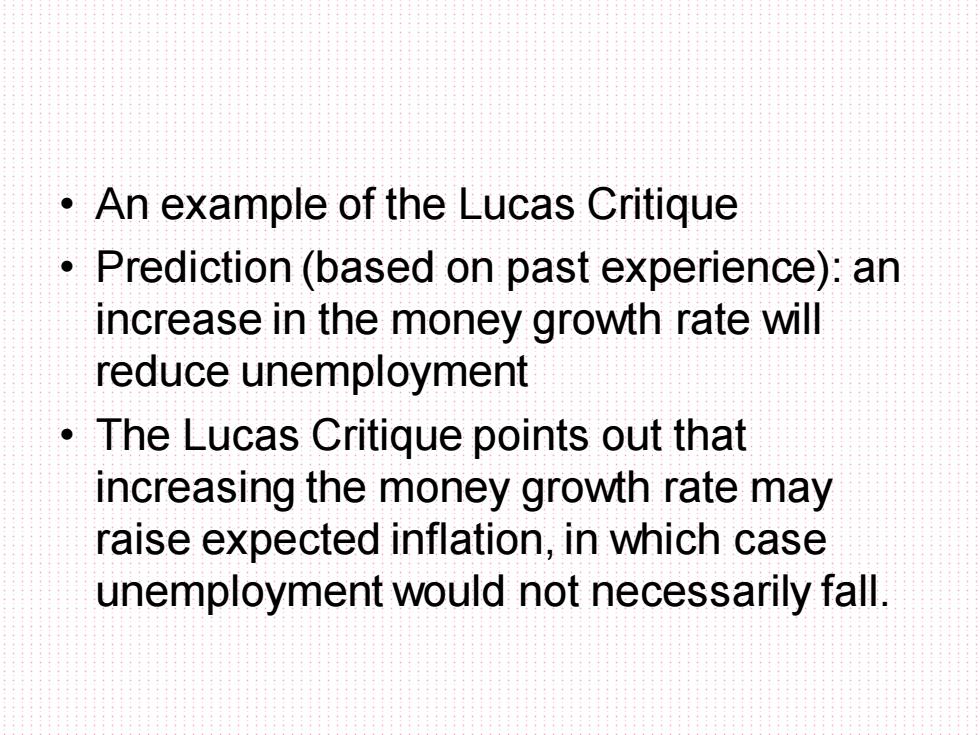
An example of the Lucas Critique Prediction(based on past experience):an increase in the money growth rate will reduce unemployment The Lucas Critique points out that increasing the money growth rate may raise expected inflation,in which case unemployment would not necessarily fall
• An example of the Lucas Critique • Prediction (based on past experience): an increase in the money growth rate will reduce unemployment • The Lucas Critique points out that increasing the money growth rate may raise expected inflation, in which case unemployment would not necessarily fall
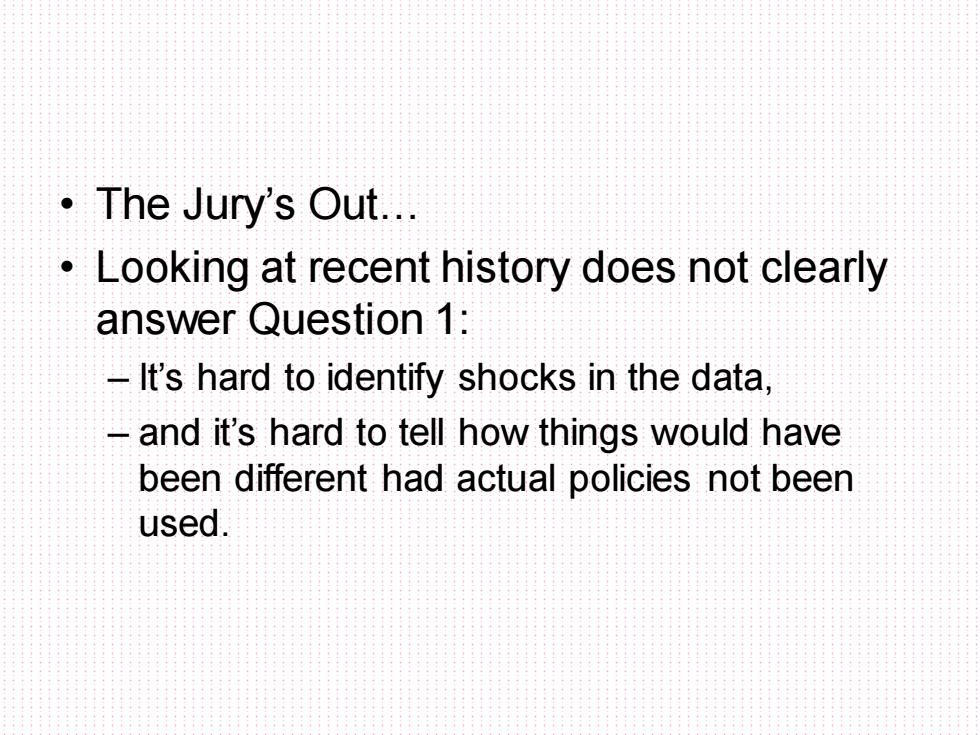
。The Jury'sOut. Looking at recent history does not clearly answer Question 1: -It's hard to identify shocks in the data, > and it's hard to tell how things would have been different had actual policies not been used
• The Jury’s Out. • Looking at recent history does not clearly answer Question 1: – It’s hard to identify shocks in the data, – and it’s hard to tell how things would have been different had actual policies not been used